Can I Get Hacked by Text? Yes! How to Protect Yourself in 2025
While it may seem alarming, text messages are one of the most popular methods used by hackers to infiltrate smartphones. However, it’s important to note that receiving a text message alone usually isn’t enough for a successful hack. What you do after receiving the message is crucial in determining whether the attack is successful or not.
In this article, I’ll show you the different ways that cybercriminals can hack your phone through text and how to protect yourself. You’ll understand the potential risks associated with text messages and learn how to safeguard your devices from cybercriminals.
After thorough research, I found that the best way to prevent getting hacked via text is by using an antivirus program. Norton is my first choice for protecting against all types of malware and hacking.
Protect your Phone with Norton
Quick Guide: How to Protect Your Device From SMS Hacks
- Install an antivirus. Norton 360’s SMS filtering and anti-phishing features are best for protecting you against text-based hacking. You can try Norton risk-free using its 60-day money-back guarantee.
- Enable real-time protection. When you install your antivirus program, don’t turn off real-time protection. The antivirus will continuously monitor your phone and block threats, including SMS hacks.
- Don’t click on suspicious links. If you get an unsolicited message from an unknown number, don’t click on the included link or share your personal information.
Step-By-Step Guide: How to Detect and Protect From a SMS Hack
It’s possible to get hacked via text when you perform certain actions. Hackers can send malicious text messages containing suspicious links to your phone. Seeing that our phones often hold sensitive information, engaging with a malicious text message can get you hacked and your private information stolen.
To protect yourself, you need to be able to identify these malicious texts. While you can try to do that manually, hackers have developed sophisticated social engineering techniques that are difficult to detect on the surface. The best way to protect yourself from getting hacked via text is by getting reliable security software. It will protect you from all threats and hacks that can be executed via text messages.
Step 1: Look Out For Unusual Text Messages
When it comes to detecting SMS hacks, the first step is to keep a close eye on any text messages that you receive. Hackers often use text messages to lure victims into clicking on suspicious links, downloading malware-infected attachments, or providing sensitive information. So, it’s essential to be vigilant and watch out for any unusual messages.
Some signs that a text message might be suspicious include:
- The sender is unknown, or the message comes from an unexpected source.
- The message contains a link or attachment that you weren’t expecting, or that seems out of context. Be especially wary about the specific URL if there’s one.
- The message asks you to provide personal information, like your login credentials, social security number, or credit card details.
- The message contains language that is threatening or urgent, designed to create a sense of panic or urgency.
If you receive a text message that seems suspicious, it’s important not to follow any instructions that it includes. Doing so could potentially compromise your device or personal information. Instead, you can report the message as spam or simply delete it from your device.
Be especially cautious of any SMS that asks for your personal information such as your credit card details, social security number, or login credentials. If you receive such messages, it’s best to contact the concerned organization directly to verify the authenticity of the message.
Step 2: Avoid Clicking on Suspicious Links
Avoid clicking on any links that you may receive via text message, unless you trust the sender and the link itself. These links may contain malware that can infect your device and compromise your personal information. However, a good antivirus software will protect you from such links.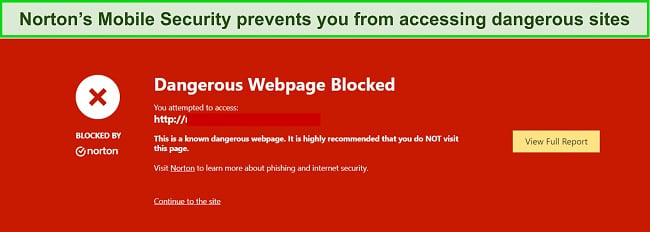
If you receive a text message that contains a link you don’t know, it’s best to avoid clicking on it altogether. Instead, you can delete the message, and report it as spam to your carrier.
Step 3: Install a Reliable Security Suite With Antivirus
To protect yourself from SMS hacks, it’s essential to install reliable security software that can detect and prevent any potential infections. Security software like Norton will detect and prevent you from getting hacked when malware, spyware, keyloggers, and other types of threats are sent to your phone via text.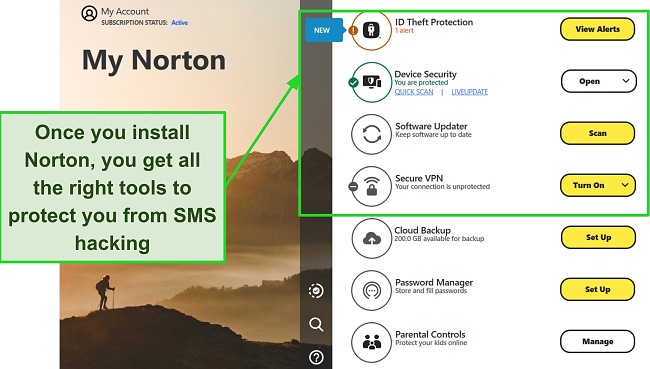
Norton has all the features that prevent text hacking like SMS filtering, app locking, anti-phishing protection, and ID theft protection, which can protect your phone from getting compromised. With Norton, if you click on a suspicious link, it will activate the anti-phishing protection, and block you from accessing the potential threat.
You should also run a full system scan with the antivirus software. It will check your entire device and scan for malware that might have been previously introduced to your phone via SMS or any other means. If it finds malware on your system, Norton will immediately delete it, protecting you from all the threats.
Can You Really Be Hacked Through Text Messages?
The short answer is yes, you can. However, it usually can’t happen just by receiving an SMS. Text messages can be used for phishing, which is when a hacker sends you a bait SMS. If you click on it, your device can get infected with malware or your personal information may be stolen.
A frequently used technique for text message hacking is referred to as “smishing.” This involves an attacker sending fraudulent text messages to deceive victims into revealing sensitive information or installing malware on their devices. Smishing messages usually appear to be from a genuine source like a financial institution or bank and often include compelling or pressing language designed to encourage the potential victim to act immediately.
If you click on the link or download the attachment included in the smishing message, your device may get infected with malware. This malware could potentially permit the hacker to gain access to your device or steal your personal information.
Text messages can also be used for hacking devices through “zero-click” exploits. These exploits target vulnerabilities in the messaging app or operating system, which enables hackers to gain remote access and control of your device without any action required from you. However, such instances are infrequent and are commonly perpetrated by state-sponsored entities.
You should also be aware that hackers can still use social engineering tactics to extract personal information from you, even if the text message itself doesn’t contain any malicious content. For instance, a hacker could pose as a friend or family member in distress and send you a text message requesting urgent help. They will then ask for sensitive information such as a Social Security Number or credit card details to exploit them later.
So, what can you do to protect yourself from text message hacking? Here are a few tips:
- Be wary of unsolicited messages, especially those containing urgent or alarming language.
- Don’t click on links or download attachments from unknown sources.
- Keep your phone’s operating system and messaging apps up to date to ensure that any known vulnerabilities have been patched.
- Use a reputable antivirus or mobile security app to scan for and protect against malware.
Finally, always exercise caution when receiving text messages, and never reveal personal information to anyone unless you are absolutely certain of their identity and intentions.
The Best Antivirus Programs to Protect Yourself From Text Message Hacks (Tested in 2025)
1. Norton — #1 Antivirus for Detecting and Protecting You From Text Message Hacks
Key Features:
- SMS protection against phishing
- 100% malware detection rates
- Secure VPN to encrypt your internet connection
- Dark web monitoring to alert you if your logins are compromised
- ID theft protection keeps your personal information safe
Norton 360 is the best software for protecting you from SMS hacks. The software comes with the right tools that prevent hackers from exploiting your device via text messages. Plus, if you’re already hacked, Norton can still protect you from further damage. You can run a full disk scan in under 12 minutes and get rid of any malicious files.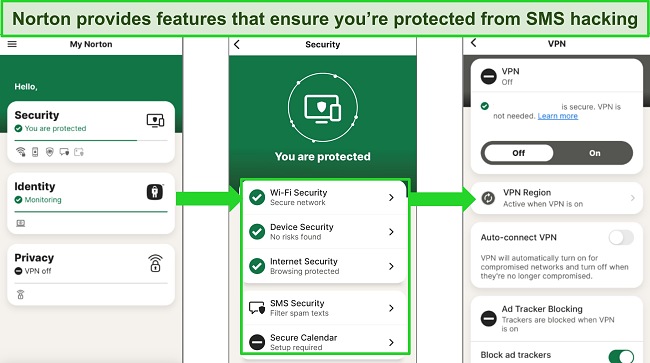
During my tests, Norton 360 successfully protected me from text-based hacks. It found 100% of the malicious links sent to me via text. Norton immediately prevented me from accessing the suspicious sites. I ran a full scan and Norton found and removed 100% of the threats that I had previously introduced to my test phone.
Norton also offers other features that can protect you from all types of threats:
- WiFi Protection — assesses the safety of networks and websites, blocking access if the risk is deemed too great.
- SMS security — stops fraudulent or malicious SMS links.
- Secure calendar — identifies potentially risky calendar invites and blocks them.
- Anti-phishing Protection — blocks every malicious site and protects your PC from shady websites attempting to infect your device with malware via text.
- Secure VPN — surf the web securely using a private tunnel that identifies and blocks cyber threats while allowing you to stream your home content while traveling.
- Cloud Backup — provides encrypted storage from 2GB to 50GB (up to 500GB for US residents) to backup sensitive files and documents.
- Password Manager — store and use all your passwords from an encrypted vault, keeping your logins safe from hackers.
- Parental Control — protects your children from accessing inappropriate sites or mistakenly downloading malicious programs.
- Dark Web Monitoring — checks the dark web for compromised logins found in data breaches.
- ID Theft Protection (US only) — prevents criminals from altering your credit score, opening accounts in your name, and other identity theft issues.
All of Norton’s features worked effectively, protecting me from getting hacked and removing malicious files from my system. Apart from preventing SMS hacks, I was happy that it could also stop hacking from calendar invites and emails.
I highly recommend using Norton 360 as a defense against text message hacking. With prices starting at just , you can select from a variety of plans that protect your phone on top of all your other devices.
The Norton 360 Standard, Deluxe, and Select plans are exceptional options to shield yourself from SMS hacks on 3 or more devices (including your phones). However, you can subscribe to the Norton 360 Mobile plan if you just want to protect 1 phone.
In case you’re a resident of the US, it’s possible for you to opt for Norton 360 + Lifelock plans. These plans offer a range of security and privacy features, such as Credit Monitoring, Identity Lock, and ID Verification Monitoring. To make things better, Norton 360 provides a money-back guarantee, which allows you to test their service for a full 60 days without any financial risks involved.
2. McAfee — Comprehensive Internet Security Tools to Prevent Text Message Hacking
Key Features:
- AI-powered anti-malware protection system
- Strong anti-phishing protection against text message hacks
- Protects you from spyware and monitoring applications
- SMS filtering to protect you from unwanted text messages
- VPN protects your personal information when browsing
McAfee is another good antivirus program that prevents your phone from getting hacked via SMS. It uses artificial intelligence through its Global Threat Intelligence system to protect you from text-based hacks and other sophisticated threats.
During my tests, McAfee’s malware scanner checked through my phone and removed all the threats that had been found. The scanner works continuously in the background and checks for keyloggers, viruses, malware, spyware, and other threats that can be introduced to my phone via text. After running a scan, and enabling real-time protection, McAfee positioned itself actively to detect every potential hacking event.
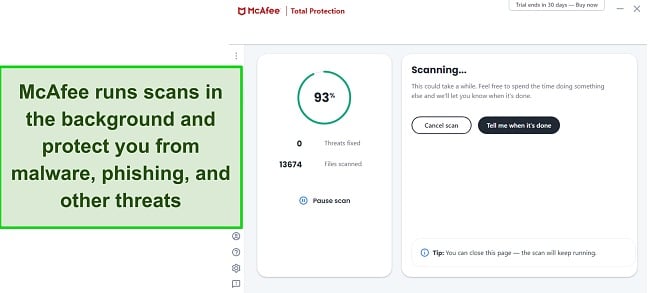
If you have McAfee installed on your phone, you’ll get unrestricted access to the following features:
- App Privacy protection — protects your privacy by monitoring which apps access your data.
- Antivirus protection — protects your device from viruses and malware, which may have been introduced to your phone via text links.
- Anti-Spyware — protects your device from spyware.
- Anti-Malware — protects your device from malware that you’ve downloaded to your phone.
- Virus Cleaner and Removal — removes viruses and malware from your device.
- Safe Browsing — protects you from malicious websites and phishing links introduced to your phone via SMS.
- Wi-Fi Security — protects your device from unsecured Wi-Fi networks.
- Contacts Backup — backs up your contacts so you can access them from any device.
In addition, McAfee provides a wide range of tools to help you secure your digital life. They include a password manager, VPN, and parental controls. With these tools, you can keep your passwords secure, protect your privacy, and keep your children safe online. However, in comparison, McAfee doesn’t offer as many features as Norton, which for instance, has an automatic password changer in its password manager.
Overall, McAfee will protect your phone from getting hacked through text messages. It comes with SMS/MMS filtering that can stop unwanted texts, keep you safe from phishing, and the antivirus will even delete any viruses that might have already gotten into your phone.
There are different plans to choose from, but I think the McAfee Plus plan is the best value. It can protect up to five of your devices (including mobile phones) from all threats on top of text-based hacking. You can also go for the McAfee Mobile Security plan (available for Android and iOS) which offers antivirus protection, VPN, ID theft protection, and WiFi protection. You can try McAfee risk-free using the 30-day money-back guarantee, starting at just .
3. TotalAV — Excellent Range of Features to Protect Against SMS Hacking
Key Features:
- Webshield protects you from downloading malicious files
- 100% malware detection rates
- Malware scanner checks your phone for malware and other dangerous files
- Data Breach Monitor alerts you if your logins get compromised
- Secure Browsing VPN protects your personal information when surfing the web
TotalAV offers a wide range of online security tools that protects you from getting hacked via text. These tools secure you on your mobile devices, desktop, and when surfing the web. With features like WebShield, Ad-blocker, and VPN, TotalAV prevents your device from getting infected through malicious text messages.
If you get a suspicious link through SMS, TotalAV will help you detect if it hosts malware or any dangerous files. During my tests, I visited several malicious sites, and TotalAV’s WebShield blocked access to all the phishing links and malware-laden sites. As this is one of the prominent ways to get hacked through SMS, I was happy that TotalAV was able to fish out all the potential hacking attempts.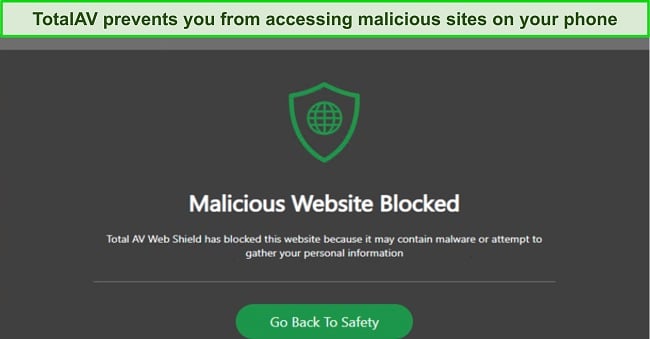
TotalAV’s features include:
- Real-Time Protection — protects your device from viruses and malware.
- Advanced Cloud Scanning — provides greater protection from new and unknown threats.
- Malware Remediation — cleans up viruses and threats detected on your device.
- Malware Scanning — scans your device for malware that may have been introduced to your phone by SMS.
- Data Breach Monitoring — monitors your device for data breaches.
- Safe Browsing VPN — protects your device while browsing online.
TotalAV has an impressive success rate of 99% in detecting malware in real time. Only Norton 360 has a perfect score in this regard. This means if you get hit with a malicious SMS intended to hack your device, TotalAV will immediately block the threat, so you won’t get infected when you attempt to download it. Unlike McAfee, I noticed TotalAV doesn’t include a firewall — a must-have for comprehensive protection.
I recommend you try TotalAV risk-free for 30 days using the money-back guarantee. You can choose from three plans — Antivirus Pro, Internet Security, and Total Security, with the pricing starting at just $19.00. You can use any of these plans to protect 3 to 6 devices, including mobile phones. The Total Security plan offers the best value and comes with standout features such as unlimited VPN, ad blocker, and password manager.
4. Bitdefender — Powerful Real-Time Protection Against Text Message Hacks
Key Features:
- Detects and protects you from SMS phishing.
- Monitor the apps on your phone for suspicious behavior.
- Web protection prevents you from accessing dangerous websites.
- VPN encrypts your internet connection and protects your personal information.
- Account Privacy alerts you if your emails are found in a data breach.
Bitdefender provides robust protection from different types of threats, including those communicated via text messages. It comes with a Scam Alert feature that detects phishing links in SMS and recommends ways to deal with the potential threat. Once turned on, it will scan your messages, and notify you if it finds suspicious links.
I was impressed with Bitdefender’s protection options. It hosts a lot of internet security tools including anti-phishing and web attack prevention that secures your device from the latest threats. By employing a method known as “Behavioral Detection,” Bitdefender diligently observes the actions of applications, software, and network connections (including downloaded files) for any signs of unusual behavior.
Bitdefender’s mobile app comes with the following features:
- Threat Scanning — examines your device for various types of harmful software such as malware, ransomware, adware, fake apps, and other potentially unwanted applications.
- Web Protection — scans web pages to detect and block malicious sites to prevent you from visiting dangerous websites.
- VPN — encrypts your mobile connection to safeguard your data and makes it untraceable to potential snoopers.
- Account Privacy — continuously monitors your email addresses to alert you when you have been part of a data breach to keep your account secure.
- Anti-Theft — enables you to remotely erase, lock, locate, and recover your data to prevent unauthorized access if your device is stolen.
- App Lock — allows you to set a pin code to lock any app on your device to prevent unauthorized access to your sensitive information.
Upon downloading Bitdefender on my Android phone, I was provided with a quick overview of each feature. Through the dashboard, I was able to assess the safety of my device and use the integrated VPN.
Unfortunately, Bitdefender’s VPN was a disappointment as it only allows a daily limit of 200MB on all plans except one. When compared to security suites such as Norton 360, which provides unlimited data usage for its VPN across all plans, Bitdefender’s offerings appear to be a less robust option.
A thorough scan of my phone revealed no harmful applications. Bitdefender is one of the best antivirus apps for Android that will protect you from malware, and alert you if your email and logins have been compromised in a data breach.
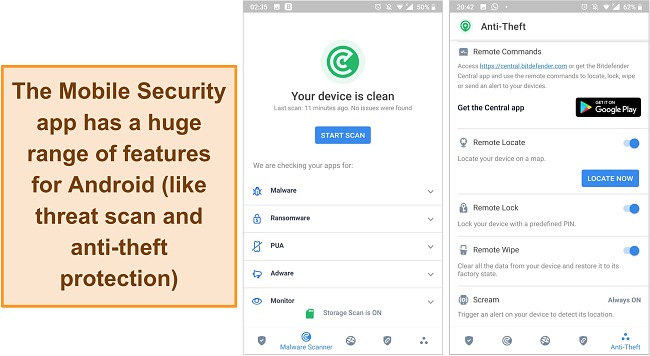
Bitdefender offers multiple plans with 100% protection against SMS hacking. The plans start at $24.99 and include Antivirus Plus, Internet Security, Total Security, and Ultimate Security. There’s also the Bitdefender Mobile Security plan for Android or iOS, in case you just want to protect mobile devices. Keep in mind, however, if you subscribe to the one for iOS for instance, you won’t be able to use it on Android and vice versa.
All plans can detect SMS phishing, block harmful apps, and protect you from text-based hacks. The Total Security plan offers the most security features at a budget-friendly price, and you can try it risk-free using the 30-day money-back guarantee.
5. Panda Security — Multiple Protection Options Against SMS Hacking Threats
Key Features:
- Antivirus protects you against phishing threats.
- Near-perfect malware detection rates.
- VPN encrypts your internet connection.
- Blocks unwanted messages and spam calls.
- Secures your WiFi connections.
Panda offers a secure antivirus that protects you from smishing and other threats. It can detect threats embedded in text messages such as phishing, keyloggers, spyware, and other malware threats. Once you install the app on your phone, it immediately activates protection against the latest threats.
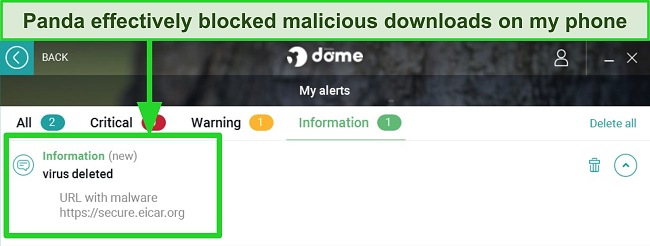
I find Panda’s antivirus technology highly impressive, as it provides equally robust protection on both mobile and desktop. Panda utilizes a combination of scanning methods to safeguard devices from real-time, ransomware, and phishing threats. When it comes to antivirus protection, Panda is among the top performers in the market as it scores 99.7% detection rates.
Panda offers the following features to protect your phone from hacking:
- Antivirus Protection — provides real-time protection against viruses, malware, spyware, and other online threats.
- VPN — protects your online privacy by encrypting your internet traffic.
- Anti-theft Protection — allows you to locate, lock, your lost devices remotely.
- App Lock — enables users to lock their apps and prevent unauthorized access.
- Call Blocker — blocks unwanted calls and messages from unknown or spam numbers.
- Parental Control — monitor your children’s online activity and set usage limits.
- Optimization Tools — improve your device performance by cleaning up junk files, optimizing battery life, and more.
- Wi-Fi Protection — secures your Wi-Fi connections and alerts you of potential threats when connecting to public networks.
I’m impressed by how easily Panda blocks downloads containing malicious software. When I tried to access websites and services that are known to harbor malware, there was no explicit sign that Panda was obstructing the site. Instead, I encountered a web page on my browser that indicated the site could not be accessed.
Initially, I suspected that there was a problem with my internet connection. However, upon further investigation of the app, I discovered the “Events” section within the Antivirus feature. This section revealed that Panda had prevented me from accessing websites containing malicious software.
Unlike other antivirus software, which charges according to the number of devices, Panda’s pricing structure is based on the level of protection and additional features provided. Each paid plan offers coverage for 1, 3, 5, 10, or an unlimited number of devices. However, I noticed that Panda’s pricing is relatively high compared to similar plans offered by leading services such as Norton and McAfee.
Panda’s plans (which all work for mobile devices) include Panda Dome Essential, Panda Dome Advanced, Panda Dome Complete, and Panda Dome Premium. Among all the plans, I recommend choosing the Panda Dome Complete plan as it features a good range of features to protect you from SMS hacks and other threats. You can try Panda risk-free using the 30-day money-back guarantee.
Tips to Prevent Getting Hacked by SMS
It’s very easy for hackers to infiltrate your phone if you don’t put in place the right precautions. Here are simple ways to protect yourself and prevent getting hacked by text messages:
- Be cautious of unsolicited SMS messages — If you receive an SMS from an unknown number, avoid clicking on any links or replying to the message. Hackers often use SMS phishing scams to trick people into giving up sensitive information.
- Only giving your phone number to trusted parties — Be careful when sharing your phone number. Only provide your number to trusted individuals if necessary and not to strangers.
- Don’t share personal information — Avoid sharing personal information like passwords, bank account details, and social security numbers through SMS. Legitimate companies will never ask for this information over SMS.
- Install antivirus software — Installing antivirus software on your phone can help protect it from malicious software that can be used to steal your personal information. Norton antivirus software comes with robust features like SMS filtering and real-time protection that will protect you from hackers.
- Update your phone regularly — Updating your phone’s operating system and apps regularly can fix security vulnerabilities that hackers can exploit. Make sure to keep your phone updated to the latest version to stay protected.
- Use a virtual private network (VPN) — A VPN can encrypt your internet traffic and make it harder for hackers to intercept your data. Consider using a VPN when using public Wi-Fi networks to stay safe. You can get an antivirus-integrated VPN when you install a security suite like Norton.
- Use two-factor authentication to secure your accounts — Two-factor authentication adds an extra layer of security to your online accounts. When you log in, you will need to enter a code sent to your phone via SMS or an authentication app. This will make it much harder for hackers to gain access to your accounts.
Quick Comparison Table: 2025’s Best AVs for Defending Yourself Against SMS Hacks
| SMS protection | Real-time protection | VPN | WiFi security | Firewall | |
| Norton | ✔ | ✔ | ✔ | ✔ | ✔ |
| McAfee | ✔ | ✔ | ✔ | ✔ | ✔ |
| TotalAV | ✔ | ✔ | ✔ | ✘ | ✘ |
| Bitdefender | ✔ | ✔ | ✔ | ✔ | ✔ |
| Panda | ✔ | ✔ | ✔ | ✔ | ✔ |
How I Tested and Ranked the Best AVs for SMS Hack Protection
Not every antivirus is capable of protecting you from SMS-based hacks. The best antivirus programs that prevent getting hacked by text must have specific features as follows:
- SMS filtering — I selected the antivirus programs that can scan text messages and have 100% detection rates for suspicious links, malware, and other threats.
- Real-time protection — I chose antiviruses that can prevent threats and malware infection with near-perfect and perfect detection rates.
- ID protection — I looked for antivirus products that offer ID theft protection by preventing unauthorized access and use of personal information.
- Phishing protection — l selected antiviruses that can effectively detect phishing links from text messages and other channels and block them.
- Additional features — I chose antivirus programs that provide extra security features such as VPN, firewall, WiFi protection, password manager, and dark web monitoring.
- Value for money — I picked cost-effective antivirus programs, which provide numerous features, and have money-back guarantees.
FAQs on Text Message Hacks
Can my phone be hacked through text message?
Yes! Your phone can indeed be hacked through a text message. Hackers employ a method known as “smishing,” which involves phishing via text messages. They might send you a link that seems to be from a trustworthy source, but it can be a malicious website that tricks you into revealing your personal information.
Keep in mind, however, that just receiving a text message likely won’t get you hacked (except in very rare cases) if you don’t take further action. You shouldn’t click on links in suspicious messages or provide your personal information with untrusted numbers. But the best way to protect yourself from text message hacking is by installing an antivirus program like Norton on your phone.
Are SMS messages safe?
Although SMS messages are usually deemed safe, they can present some risks, especially when it comes to SMS phishing attacks. Scammers can leverage text messages to send fake links that can lead you to harmful websites or apps.
However, you can shield yourself from such risks by installing an antivirus app such as Norton Mobile Security. Norton works by identifying and blocking phishing attacks before they can cause any harm to your device or compromise your private information.
Can I be hacked through a phone call?
Yes, it is possible to be hacked through a phone call. Hackers can use a technique called “vishing,” which is a form of phishing that is done via phone calls. They may pretend to be a representative of a trusted organization, such as a bank or government agency, and ask you for sensitive information like your social security number or credit card details.
They can also use social engineering tactics to trick you into downloading malware or giving them access to your device. That’s why it’s very important to install an antivirus program like Norton to protect you from these threats.
How can I check if a text message is safe?
Will an antivirus protect me from getting hacked through SMS messages?
How can I avoid getting a virus through text messages?
Protect Yourself From Any Text Message Hack With Top-Tier Antivirus Software
Hackers continuously search for creative ways to compromise your device. One such way is by attempting to hack your phone through text messages. They do this by sending you unsolicited and malicious messages, which can get your phone hacked if you click on them. That’s why it’s important to protect your phone from text message hacking by installing an antivirus program.
I evaluated more than 20 antivirus solutions to determine the most effective options for safeguarding you against SMS hacking. Based on my findings, Norton 360 emerges as the preferred choice for shielding your phone against text message-based hacking attempts. Its real-time protection, SMS security, anti-phishing protection, and WiFi security keep your phone secure from SMS hacking threats. You can download Norton to your phone and try it risk-free for 60 days using the money-back guarantee.










Leave a Comment
Cancel